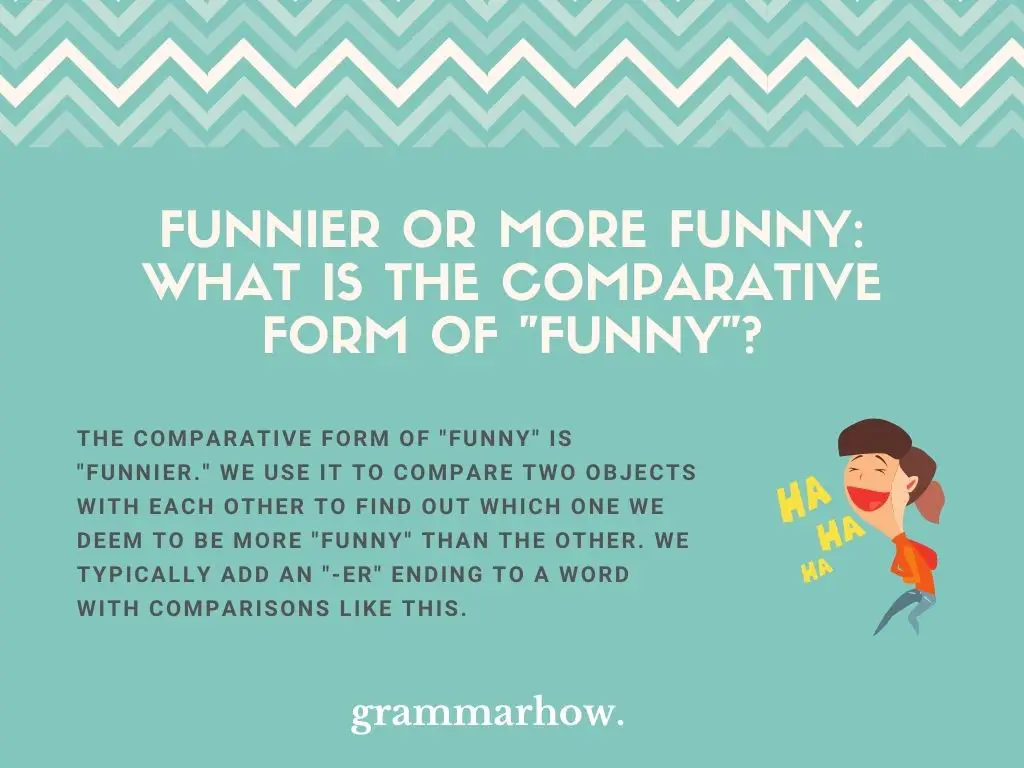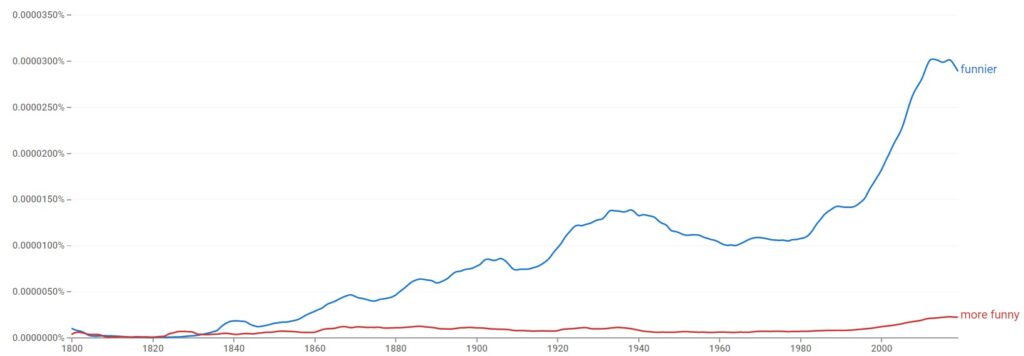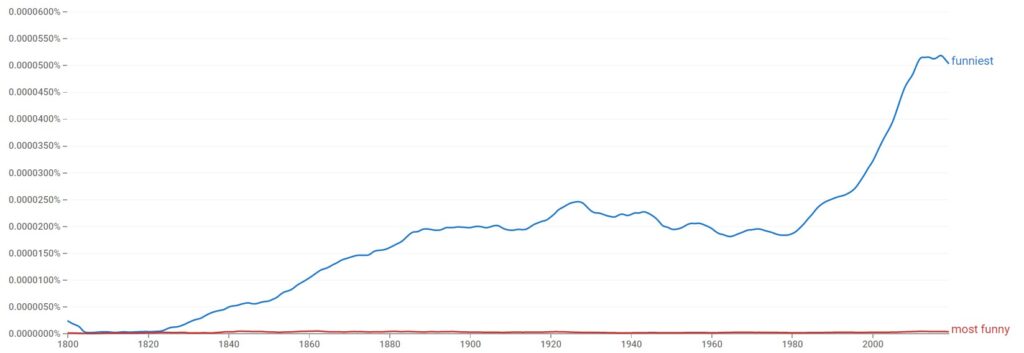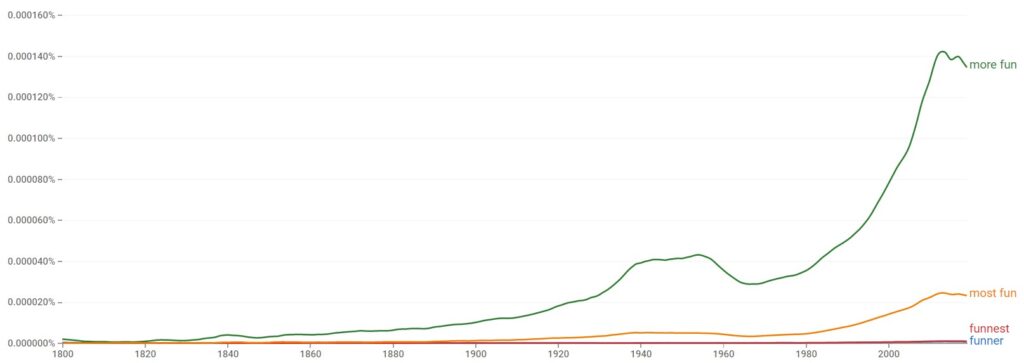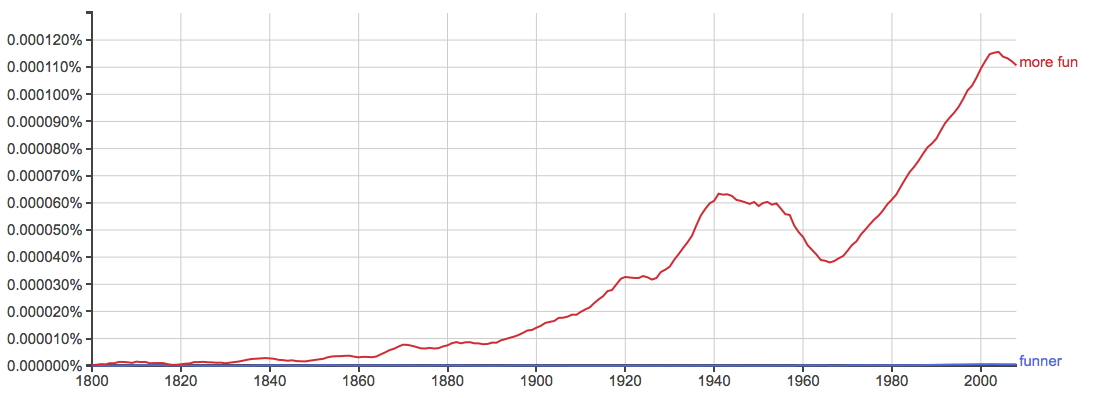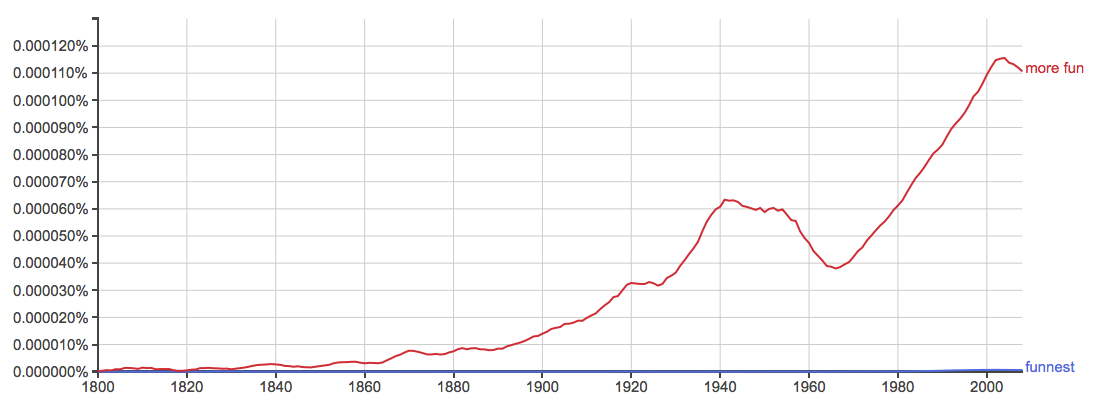Is “Funnier” A Word?
Comparative diction in English can be a very challenging thing. Some words have comparatives built-in, while others need to be paired with “more” or “less” to be correct. Funny, however, has its own unique rules and can change depending on how you are using it.
In short, “funnier” is technically a word; however it has its specific usage rules and cannot be substituted in for “more/less funny.” to clear things up, “funnier” is a word that can be used in specific comparative situations. In contrast “less funny” is more apt for talking about situations that lack humor. In addition, “more funny” is also a correct term technically. However, it can be clunky and has lost popularity over the years.
How To Use “Funnier” And “Less Funny”
First, “funnier” is a correct term that can be used to compare situations with a lot of humor. This works because the comparison “-ier” is built-in grammatically correct. For example, you could use this word in a sentence like, “I think that Mark’s presentation was funnier than Dan’s.”
You should probably avoid using “more funny” in these situations, as most think it’s clunky. Although it is correct to use, “funnier” is more widely accepted in today’s day and age.
Lastly, you should use “less funny” to describe situations that aren’t funny. This works best because there isn’t a built-in comparative to say “less funny,” and it simply sounds better in the end. For instance, you could say something along the lines of, “I think that Dan’s presentation was a lot less funny than Mark’s.”
Using “More” And “Less” With Funny
You can technically use “more” and “less” with funny, and in some cases, it is even suggested. However, there are some situations where “more” and “less” become very important. If you find something moderately funny or feel apathetic about it, you can use “more/less funny” to describe your feelings.
For instance, you could say, “I found the book more or less funny,” or “I found it more funny than not.” Statements such as these allow your reader to know that you thought something was mildly funny.
Examples Of Using “Funnier” And “Less Funny”
Here are some basic examples of correctly using “funnier” and “less funny.”
- I didn’t enjoy my night. I was expecting the board game to be more fun.
- After careful deliberation, we think that Ramon’s presentation was funnier than everyone else’s.
- That amusement park was a lot less fun than I had hoped for.
Related: A lesson on “Fewer” and “Less”
Want to sharpen your business writing skills? Discover our acclaimed online courses at syntaxtraining.com Whether you want to learn about taking taking meeting notes, become a master proofreader, master punctuation or tune-up your business writing skills, our courses are here to help you.
Comparatives can be a tricky aspect of the English language to master. Sometimes the comparative is built into the word itself, and other times it is paired with “more” or “less.” Unlike the term fun, which is a noun in and of itself and is almost always reserved for use with “more” or “less.”
Example:
I expected the game night to be more fun than that.
The term funny is an adjective and can therefore be a bit more fluid. Let’s take a look.
Comparing to other things
So, is funnier a word? In short, yes.
When talking about two separate entities, funnier is the way to go. It is the comparative of funny. For example, walking out of an open comedy mic, you might remark to your friend, “The first comedian was definitely funnier than the second.” Or, if you have your own little friendly competition, you might protest, “My joke was funnier than yours!”
On the other side of that coin, when talking about things that lack humor — or lack it in comparison to other things — you could say, “The second comedian was not as funny as the first,” or “Your joke was less funny than mine.”
The term more funny on its own feels a bit awkward and, thus, generally does not hold up. Funnier has a built-in comparative aspect and an easier flow off the tongue.
Comparing to itself
When the comparison is vaguer or internally focused, “more” and “less” come into play in a more prominent manner. Let’s say you have seen a movie that you found moderately humorous; you might say, “It was more or less funny,” or “It was more funny than not.” This tells the listener that you are willing to cede some level of humor — but not that it was the funniest thing ever.
Examples of using “funnier”:
I have extensive experience writing in a variety of genres, from literary novels to music reviews to academic articles. I appreciate the power of words.
Comparative and superlative forms are important aspects of English grammar. This article will look at the comparative and superlative forms and how they apply to “funny.” We will look into “funnier” and “more funny,” as well as a few other varieties.
Funnier Or More Funny: What Is The Comparative Form Of “Funny”?
The comparative form of “funny” is “funnier.” We use it to compare two objects with each other to find out which one we deem to be more “funny” than the other. We typically add an “-er” ending to a word with comparisons like this.
“Funny” is two syllables, which comes with its own set of rules to follow.
Normal comparative form rules dictate that one-syllable words have an “-er” ending, while multiple-syllable words (three or more) use “more” before the word. For example:
- Harder
- More difficult
However, “funny” is two syllables, which isn’t directly covered in the rules. For the most part, two-syllable words follow comparative form rules based on how they sound.
Many native speakers think that “more funny” sounds a bit jarring, which is why it’s not used. Instead, we use “funnier” to show that someone or something is more “funny” than another thing.
Technically, “more funny” is not correct, but it’s far from popular, and many people avoid it at all costs.
Funniest Or Most Funny: What Is The Superlative Form Of “Funny”?
“Funniest” is the correct superlative form of “funny.” This time, we use it to compare more than one item and see which one is the “most” funny of the group. It can refer to a group or two or more, whereas the comparative form only ever refers to two.
We follow similar rules to the comparative form above, where we ignore the “most” starting word because “funny” is a two-syllable word that would sound strange as “most funny.”
The rules are similar whether we look at the superlative or comparative forms. We can take the same examples from the above section to show you how the “-est” ending applies to one-syllable words and “most” applies to multiple-syllable words.
- Hardest
- Most difficult
Again, we use “funniest” based on feel rather than any specific grammar rules. It’s much cleaner to see a sentence using “funniest” over the alternative “most funny.”
While “more funny” is sometimes used because it is technically correct, the same does not apply to “most funny.” Many people think it makes no sense, and it’s far too jarring in many written forms. Therefore, it is not grammatically correct.
What Are The Different Forms Of “Funny”?
Now that we’ve seen all the forms that are relevant to the word, it’s time to make it a little more comprehensive.
| Word | Funny |
| Comparative | Funnier |
| Superlative | Funniest |
“More funny” and “most funny” are best left unwritten. We tend not to use them as either the comparative or the superlative form, so you should stick with the “-ier” and “-iest” endings of “funny.”
How Prevalent Is The Use Of “Funnier” And “More Funny”?
We also have a few graphs that might help make the popularity of the two words clearer to you.
According to Google Ngram Viewer, “funnier” is by far the most popular choice for native writers to use. “More funny” has grown slightly in popularity in recent years, but it’s nowhere near the level of “funnier” in all cases.
As you can see, that proves that “funnier” is always the way to go. Many native speakers value it more as the comparative form, which is why we recommend sticking to it.
How Prevalent Is The Use Of “Funniest” And “Most Funny”?
The same graph can be given to you to see how “funniest” and “most funny” compare.
According to Google Ngram Viewer, “funniest” is by far the most popular choice. This time, “most funny” is barely used in comparison, showing that it is far from a top choice for any native speakers to use.
To make sure you get the superlative form correct, just stick with “funniest.” There isn’t any wiggle room with this form either (unlike the comparative form where “more funny” had a bit of usage).
More often than not, a native speaker will think you’ve made a grammatical mistake if they see you write “most funny.”
Examples Of How To Use The Comparative Form Of “Funny” In A Sentence
Some examples using only the correct forms of each “funny” variation should help you make more sense of it. Once you’ve read through these, you won’t struggle with them again!
- You are funnier than I am, but I’ll make sure to make everyone laugh when I can.
- I don’t want him to be funnier than me anymore, but I don’t know how to stop people from thinking I’m boring.
- I think that this comedian is funnier than that one, though I know that everyone is entitled to their opinions.
- Do you think you’re funnier than me? I’d love to see which one of us can get the most laughs in front of an audience!
- We are funnier when we are together, but it doesn’t happen all that often, unfortunately.
- They think they’re funnier than they are, which is why they always come up with those lame and crude jokes.
- You are not funnier than her, but I appreciate the effort you put into trying.
“Funnier” is the only correct comparative form we use. It works when we are comparing two things with each other to see which is comparatively “more funny” than the other thing.
Examples Of How To Use The Superlative Form Of “Funny” In A Sentence
Check out how the superlative form works as follows:
- Which of your friends would you consider to be the funniest?
- I am by far the funniest member of my family, and everyone knows it too!
- You are the funniest when you are with her, which is why I think you two are made for each other.
- I’m the funniest person in my class, and I always make sure that everyone leaves the lesson with a great big smile on their face!
- You are the funniest person I’ve ever met, and you should consider taking up a career in comedy.
- She is the funniest girl I’ve ever had the pleasure of meeting.
- We are the funniest group of people, and I think we should start looking at posting our antics online!
“Funniest” is the only correct superlative form. We use this form when we are comparing multiple items (two or more) together, and whichever one comes out on top ends up being the “funniest” option.
Is It Ever Correct To Use “Funney”?
We’ve seen all we need to about “funny” and its forms. However, there are a few other common errors that we need to go over to see how they work.
“Funney” is not correct. It’s a misspelling of “funny,” and it should never be used. You do not need the extra “E” letter before the “Y.”
Does “Fun” And “Funny” Mean The Same?
“Fun” and “funny” do not mean the same thing. “Fun” means that someone or something is enjoyable or exciting, while “funny” means that someone or something makes you laugh or is good at telling jokes.
Typically, “fun” people can be a pleasure to be around because they always know the best places to visit and the best things to do.
However, “funny” people can make you laugh easier based on what they say or their actions.
There is plenty of overlap between each word. A “fun” person can be seen as “funny” while they are out doing fun things, and a “funny” person can be “fun” to be around if they consistently make someone laugh.
Is It Ever Correct To Use “Funner” And “Funnest”?
Now that we know the key differences between “fun” and “funny,” let’s explore the comparative and superlative forms of “fun” a little while we’re here.
“Funner” and “funnest” are not correct forms of “fun,” according to Google Ngram Viewer. Instead, we should only use “more fun” and “most fun” when we are looking to create the comparative and superlative forms, respectively.
Interestingly, this contradicts what we said earlier. Standard comparative and superlative rules state that one-syllable words need a “-er” and “-est” ending. However, “fun” is a one-syllable word, but this rule does not apply.
Unfortunately, some English words are like this, and they become exceptions to common rules. It’s just something you need to understand and work with. Eventually, you’ll learn all the major exceptions that you need to focus on.
Here are a few examples to help you remember the correct forms:
- Correct: You are more fun than I am, which is why I think you should take charge of this adventure.
- Incorrect: She is funner than me, and I don’t know what I can do to get everyone interested in what I want to do.
- Correct: We have the most fun when we are together, and I couldn’t think of anyone out there as a better friend than you.
- Incorrect: You are the funnest person I know, and you always know where to take your friends to treat them to a good time.
You may also like:
“Much” And “Many” – Comparative and Superlative Forms Explained
“More Fair” or “Fairer” – Correct Comparative Revealed
“Sincere” – Comparative and Superlative Forms Explained
Funny Enough or Funnily Enough – Which Is Correct?
Martin holds a Master’s degree in Finance and International Business. He has six years of experience in professional communication with clients, executives, and colleagues. Furthermore, he has teaching experience from Aarhus University. Martin has been featured as an expert in communication and teaching on Forbes and Shopify. Read more about Martin here.
-
#1
Hello!
Whenever you have a short adjective you add ‘er’ or ‘ier’. But since I saw ‘more fun’ being used I believe this is not a general rule, is it?
I need to know why ‘more fun’ is correct AND if it is equivalent to ‘funnier’.
Can anyone please help?
Cheers,
Tito
-
#2
[I am not a teacher]
I don’t think they are equivalent.
-
#3
«Fun» and «funny» are two different words.
«Funnier» is something that is more funny.
«Funner» is something that is more fun. I would only use «more fun.» «Funner» strikes me as an odd word.
-
#4
Hello.:-D
I’ve always thought ‘fun’ is an uncountable noun. It is, however, listed as an adjective in many dictionaries here.
1. funny — funnier — (the) funniest — ‘funny’ is an adjective
2. much fun — more fun — (the) most fun — ‘fun’ is a noun modified by ‘much’
When the ‘fun’ is used as an adjective, its comparative and superlative would be:
fun — funner — funnest
I agree with SoothingDave that ‘fun’ and ‘funny’ are two different words.
-
#5
I was honestly surprised to see «funner» in the dictionary. I would not say «a bad day on the golf course is funner than a good day at the office.» I would say «more fun.»
-
#6
I was honestly surprised to see «funner» in the dictionary. I would not say «a bad day on the golf course is funner than a good day at the office.» I would say «more fun.»
I find your sentence odd, too. I’d probably write/say ‘more fun’ in that case. (And I personally think the ‘fun’ in your sentence is a noun. Therefore ‘more fun’.)
Then, what about:
There is a fun thing to do here.
1. There is a funner thing to do there.
2. There is a more fun thing to do there.
Would you choose #2?
Last edited: Jul 24, 2013
-
#7
I find your sentence odd, too. I’d probably write/say ‘more fun’ in that case. (And I personally think the ‘fun’ in your sentence is a noun. Therefore ‘more fun’.)
Then, what about:
There is a fun thing to do here.
1. There is a funner thing to do there.
2. There is a more fun thing to do there.Would you choose #2?
It’s a predicate adjective as I reckon it. It’s describing the day. Day is more fun.
I would not choose #2 either. I would avoid the word «funner» completely. But that is me.
-
#8
I have decried the adjectival use of fun in the past: see the thread «Fun is a noun goddammit» under English Idioms and Sayings. But the evolution of the language grinds on relentlessly.
Last edited: Jul 25, 2013
-
#9
Hi tzfujimino,
much better-more better-(the)most better. Is it correct?
-
#10
Hi tzfujimino,
much better-more better-(the)most better. Is it correct?
Hello, UM Chakma.:-D
No, it isn’t.
‘good (well) — better — (the) best’ is correct.
-
#11
I am completely aware of «good-better-best». I have seen a number of times «much better» used by people. That is what made me ask the question. Also «much easier».
-
#12
«Much better» is fine, but there would not be a «most better.»
-
#14
I am completely aware of «good-better-best». I have seen a number of times «much better» used by people. That is what made me ask the question. Also «much easier».
Hello, again.:-D
«Much better» and «much easier» are both correct, but you cannot say «more better» or «(the) most better».
-
#15
That’s a word I wouldn’t expect to find in a dictionary. It is mostly used among preteen girls who have bestest friends forever. (BFFs)
-
#16
That’s a word I wouldn’t expect to find in a dictionary. It is mostly used among preteen girls who have bestest friends forever. (BFFs)

I didn’t expect it either. I just googled it and found the reference I gave. I have never used it, and I’m in no rush to do so (my preteen years went by some time ago already, to say the least). However, I did warn it was slangy. That done, it’s always up to readers of the post to use it or forget it). :up:
-
#17
Are «much better» and «much easier» type of idioms?
-
#18
I think I am now getting it. Then I can use «much» with other comparative forms. Can’t I? For examples: much worthier, much lazier, much harder, much stronger. Correct?
-
#19
I think I am now getting it. Then I can use «much» with other comparative forms. Can’t I? For examples: much worthier, much lazier, much harder, much stronger. Correct?
Yes, you can.
Are «much better» and «much easier» type of idioms?
I wouldn’t call it an ‘idiom’.
Comparatives are modified by much/far/even/a bit/a lot etc.

-
#20
Am I correct? Wow! Thank you very much. A confusion of a long time has been just sorted out. I have to note down these all «much/far/even/a bit/a lot».
-
#1
I have a doubt. I was wondering if the comparative of «fun» (as an adjective) is «funner» or «more fun».
funny is funnier, but «fun»?
thanks
-
#2
Hi,
As far as I know ‘funner’ doesn’t exist in English, only ‘more fun’.
but let natives say a word
Saludos
-
#4
The truth is, «fun» is not an adjective but a noun: «we had a lot of fun» — «we had more fun today than yesterday»
However, it’s informally used -but
not exactly
correct- and pretty much accepted as an adjective. Therefore, since it’s not a real adjective «funner» and «funnest» are
not
said.
On the page indicated by m_lara_r, they mention «funny», which is an adjective and the comparatives are «funnier» and «funniest«
Last edited: Apr 14, 2013
-
#5
Correct: «funner» and «funnest» are used in English by children. They are not considered correct in standard English.
Informally, it is quite common to hear «We had a fun time» or some variation. Dictionary.com lists its use as informal. (I checked to make sure.)
-
#6
The truth is, «fun» is not an adjective but a noun: «we had a lot of fun» — «we had more fun today than yesterday»
However, it’s informally used -but
not exactly
correct- and pretty much accepted as an adjective. Therefore, since it’s not a real adjective «funner» and «funnest» are
not
said. […]
Even my Concise OED, which I’ve had for more than forty year, recognizes «fun» as an adjective («amusing, entertaining, enjoyable») without feeling any need to gloss it as informal. «Funner» and «funnest» are not said (except by children) because the accepted comparatives are «more / most fun.»
-
#7
Even my Concise OED, which I’ve had for more than forty year, recognizes «fun» as an adjective («amusing, entertaining, enjoyable») without feeling any need to gloss it as informal. «Funner» and «funnest» are not said (except by children) because the accepted comparatives are «more / most fun.»
fun (fŭn)
adj. Informal
Enjoyable; amusing: «You’re a real fun guy»
The American Heritage® Dictionary of the English Languagefun
adjective Informal: intended for, or giving, pleasure or amusement: a fun gift
Webster’s New World College Dictionary
fun
Pronunciation: /fʌn/
adjective
informal
amusing, entertaining, or enjoyable: it was a fun evening
Oxford dictionaries
These are just a few dictionaries that consider informal the use of «fun» as an adjective. By the way I changed the color of «informal» to red to make it stand out.
Some dictionaries I found don’t even mention the fact that «fun» can be an adjective, informal or not.
-
#8
Hullo.
I think a rule of thumb for labelling «fun» as a noun or an adjective is that it is an adjective only when it is followed by a noun.
Thus, «He’s a fun guy» (adj.), but «She’s great fun» (noun).
That said, I feel rather insecure about «He’s fun to work with».
GS
-
#9
I can´t see anything wrong with fun as an adjective as in «he’s fun to work with.»
The usual comparative/superlative would be, «He´s more fun to work with than my previous boss.» «He´s the most fun of all the bosses I have ever had.»
In time it is logical that «funner» and «funnest» will be accepted though they are not yet standard English.
For example I saw an advert where Apple described the iPod Touch as the “funnest iPod ever.»
-
#10
I can´t see anything wrong with fun as an adjective as in «he’s fun to work with.» […]
Or with «we’ll see if we can find some fun things to do for the weekend.» I think the dictionaries have some catching up to do with this usage.
-
#11
Or with «we’ll see if we can find some fun things to do for the weekend.» I think the dictionaries have some catching up to do with this usage.
Yes, that’s true. Language evolves because common usage changes and grammarians and dictionaries ought to accept that.
-
#12
A. This is going to be a fun year.
B. It could be a funner year if…
Eso es algo que he escuchado en una serie. Por tanto, ya, 9 años después de este post, parece que empieza a normalizarse su uso. No sé si ya es más frecuente en la calle que antes.
-
#13
@ splurge
Eso no se oye en mi calle, ni lo empleo yo.
-
#14
A. This is going to be a fun year.
B. It could be a funner year if…Eso es algo que he escuchado en una serie. Por tanto, ya, 9 años después de este post, parece que empieza a normalizarse su uso. No sé si ya es más frecuente en la calle que antes.
No, the incidence of this use is not increasing. There have always been native speakers with a limited grasp of English grammar knowledge who say «funner» and «funnest,» but those are not accepted as correct by the majority of speakers.
In the context you heard, it is also possible that the speaker intentionally made this mistake for affectation (to make it humorous).
Correct: The year could be even more fun if…
-
#15
I know that it is commonly rejected, but I do say «funner» sometimes in very informal conversations (mostly as a joke, though I don’t personally know why people are so against its use).
-
#16
Both an adjective and a noun; this very word reference dictionary explains it ok.
As an adjective, we can say eg «We had a fun day.» Comparative would be «We had a more fun day on Sat than on the Friday.» Or, «The most fun day on the trip was the Wednesday when we visited ….»
As a noun, eg «It was a lot of fun» , «We had so much fun». Comparative and superlative: «We had more fun than they did.» Or «That was the most fun I’ve had for ages».
-
#17
These sound a little «off» to me, as if fun is not quite a fully versatile adjective (yet):
You’re a more fun guy than George.
You got a more fun gift than I did.
Saturday was a more fun day than Friday.
The most fun day on the trip was the Wednesday we visited ….
It could be a more fun year if ….
As is the case with most English and grammar related topics, people tend to have strong opinions one way or the other. Today’s topic is no different, and I expect this post to elicit some strong opinions between the two primary camps.
On the one side, you have those who say that fun can never take the comparative and superlative endings that are typical of adjectives, i.e., funner, funnest.
On the other side, you have those who say that fun is well established as an adjective in writing and speech, and, therefore, must be allowed to inflect like one.
Is Funner a Real Word: How about Funnest?
In this post, I hope to reach some type of middle ground between these two camps and advise the average writer on how to proceed with the word fun. Is funner a word? Is funnest a word?
Let’s find out.
Is Fun a Noun?
What everyone agrees on is the fact that fun is a noun. It emerged as such in the late 17th century as a “cant” or slang word.
- We had fun at the party last night.
- Riding a motorcycle is great fun.
- Seibert also brings in the matter of personality—charisma and charm, which are crucial matters in tap—and he has some fun with people who were short on it. –The New Yorker
The phrase “we had fun” is the grammatical equivalent of “we had pizza.”
- We had fun at the party last night.
- We had pizza at the party last night.
Yes, fun is more of an abstract idea than a physical pizza, but they both function as nouns in such a sentence.
Is Fun an Adjective?

- That was a fun movie.
- We had a fun time.
- The beach is a fun place.
In all of the above sentences, fun is being used as if it were an adjective. Is this acceptable? That depends, largely, on whom you ask and their age.
As I mentioned above, everyone agrees that fun is a noun, and for more than 200 years, it functioned almost exclusively as a noun.
Sometime in the early-to-mid 1900s its use began to drift, probably as a result of its quasi-adjective/ambiguous use in phrases like “a fun fair” or sentences like “It is fun to ski.” It’s still being used as a noun in these two examples, but it looks as if it could be an adjective. This ambiguity probably led to its misuse.
Traditionalists hold that fun can only function as an noun, while others claim it can be an adjective too.
The Oxford English Dictionary states that the use of fun as an attributive adjective (a fun trip) is now established in informal use but is not accepted in Standard English. The American Heritage Dictionary advises writers to avoid it in formal writing.
This would be my advice as well. If you want your writing to appear authoritative, I would advise you not to use fun as an adjective. If you are writing a research paper, job cover letter, resume, college application, etc., you should avoid this use and hold to the traditional rule:
- Fun is a noun, not an adjective.
While the use of fun as an attributive adjective (a fun time) is common to hear in informal speech, the comparative and superlative forms funner and funnest, as if fun were a standard adjective, is another matter altogether.
Outside of direct quotations, usually those of small children, the use of funner is almost universally rejected and almost never appears in printed sources.
The above graph charts funner vs. more fun in books since 1800. In the past 200 years, funner has barely even registered in these print sources across American and British English.
The same goes for funnest; you can hardly make out the line of its printed use.
This should be expected, of course. These types of nonstandard words are usually only found in speech and not in edited prose.
What’s the Bottom Line?

First, I am among the group of writers who find funner and funnest to be particularly grating, so, on some level, it is a personal preference.
Second, I think this is the majority consensus of readers and writers. With the popular use of these two forms, more fun or funner / most fun or funnest, so incredibly lopsided, it is clear to see what is acceptable and what is unacceptable.
More fun is accepted; funner is not.
Most fun is accepted; funnest is not.
If you want to be taken seriously as a writer or you are an ESL student learning the language, do not use funner or funnest or your writing.
Summary
Fun is increasingly being used as an attributive adjective in informal contexts.
If one were doing a piece of formal writing, research paper, resume, cover letter, dissertation, etc., I would advise the writer to steer clear of fun as an adjective.
Avoid completely the words funner and funnest.
Contents
- 1 Is Funner a Real Word: How about Funnest?
- 2 Is Fun a Noun?
- 3 Is Fun an Adjective?
- 4 Funner or More Fun?
- 5 What’s the Bottom Line?
- 6 Summary
Question
Обновлено на
20 окт. 2022
-
Испанский
-
Английский (американский вариант)
-
Французский
-
Английский (британский вариант)
Вопрос про Английский (американский вариант)

When you «disagree» with an answer
The owner of it will not be notified.
Only the user who asked this question will see who disagreed with this answer.
-
Шведский
-
Английский (американский вариант)
Funnier, you can also say ‘more fun’ in some instances.
-
Английский (американский вариант)
More funny is the grammatically correct way of saying it. “Funnier” is not a real word, but people still use it
-
Английский (американский вариант)
-
Испанский (колумбийский вариант)
Funnier
-
Английский (американский вариант)
More fun is correct when talking about fun, but funnier is correct when talking about comedy.
-
Английский (американский вариант)
Funnier is a real word. Funner is not a real word
-
Английский (американский вариант)
Funnier
-
Английский (американский вариант)
funnier=más gracious, more fun=más divertido. «Funner» es siempre incorrecto. Si es *posible*, segun las reglas, utilizar la forma -er, es obligatorio.
[News] Эй, привет! Тот, кто учит язык!
Вы знаете как улучшить свои языковые навыки❓ Все, что вам нужно – это исправление вашего письма носителем языка!
С HiNative ваше письмо носители языка могут исправить бесплатно ✍️✨.
Зарегистрироваться
-
“goofy” “clumsy” which is more sounds like joke and kind to girl to say
ответ
Both of these terms sound funny. «Goofy» means something more like «humorous», while «clumsy» means that they might be prone to dropping thin…
-
Is ‘Jokes on you’ the same as ‘Just kidding’?
ответ
No, «jokes on you» is used more to tease someone about something, and «just kidding» is to let someone know that you’re not being serious abo…
-
В чем разница между bonehead и silly? Isn’t both meaning silly or used when someone is acting sil…
ответ
“Bonehead” sounds more rude to me.
- Is «lol» still popular word to express laughing?
-
I’ve never heard an American says “I laugh” after tell a joke. Is there an expression? Bc in Fren…
ответ
People will say «I’m kidding» or «Just kidding.»
-
Does”interesting people “ mean funny people or people with a good sense of humor?
ответ
It can,(for both) it could also be used to mean people who grab your attention for any reason.
~Such as a group of «interesting people» bec… -
Which is more common, “funnier” or “more funny”?
ответ
I think I hear “more funny” a tad bit more than “funnier” (?) Overall both are pretty equally used
-
Why is the phrase “ I pity the fool” so funny?
ответ
It’s the catchphrase of the character Mr T.
-
“What do you call an interracial relationship?”
…..happy.
What’s the catch here??
-
what is correct?
Where are you study?
Or
Where do you study?Thank you.
- How to respond to «I hope you are doing well»?
-
Choose the correct answer :
Despite a reputation for——output, he had the —-to take credit f… -
If you are not the correct person, please direct me the correct one.
Does this sentence sound nat…
-
попросил ChatGPT составить предложения с глаголами ВЫ-
как они звучат? Стоит использовать?Вчера…
- есть больше времени на учёбу. is this sentence true? I want to say “there is more time to study” …
- Космический зонд Juice отправляется к лунам Юпитера, чтобы узнать, могла ли там зародиться жизнь….
- I want russian slang words that only real russian use
-
«Булочки упали и разобрались»
«Булочки упали и разбились»
Какой вариант подходит?
-
пожалуйста
Витя, ты опять опоздал на урок. Смотри, чтобы
A. этого больше не было
B. Этого боль…
-
Помогите, друзья. Какое предложение правильное?
Ребята пишут своё имя на тетради. или Ребята пишу… -
попросил ChatGPT составить предложения с глаголами ВЫ-
как они звучат? Стоит использовать?Вчера…
-
— Ты обещал взять мой зонт из ремонта. Ты его взял ?
— Нет, «не взял».(вообщее не делал или по…
-
Выберите правильный вариант, употребите слово в нужной
форме.
1) Стихотворение «Нате!» Маяковс…
Previous question/ Next question
- hello everyone I’m really interesting in English but I’m not the best as you see i have a lot of …
- ¿Qué significa ‘cachimba’?…
Что означает этот символ?
Символ показывает уровень знания интересующего вас языка и вашу подготовку. Выбирая ваш уровень знания языка, вы говорите пользователям как им нужно писать, чтобы вы могли их понять.
-
Мне трудно понимать даже короткие ответы на данном языке.
-
Могу задавать простые вопросы и понимаю простые ответы.
-
Могу формулировать все виды общих вопросов. Понимаю ответы средней длины и сложности.
-
Понимаю ответы любой длины и сложности.
Подпишитесь на Премиум и сможете воспроизводить аудио/видеоответы других пользователей.
Что такое «подарки»?
Show your appreciation in a way that likes and stamps can’t.
By sending a gift to someone, they will be more likely to answer your questions again!

If you post a question after sending a gift to someone, your question will be displayed in a special section on that person’s feed.

Устали искать? HiNative может помочь вам найти ответ, который вы ищете.
A search of Google Books for the phrases «the more funny» does turn up a few relevant matches, though some of the matches returned are not relevant because they involve the form «the more X, the more Y,» where either X or Y = «funny things» (for example), so more in those cases is modifying things, not funny. Still, the admirable G.K. Chesterton, in Heretics (1905) uses «more funny» in a situation where, as far as I can see, he could have used «funnier»:
The question of whether Swift was funny in his irony is quite another sort of question to the question of whether Swift was serious in his pessimism. Surely even Mr. McCabe would not maintain that the more funny «Gulliver» is in its method the less it can be sincere in its object. The truth is, as I have said, that in this sense the two qualities of fun and seriousness have nothing whatever to do with each other, they are no more comparable than black and triangular. Mr. Bernard Shaw is funny and sincere. Mr. George Robey is funny and not sincere. Mr. McCabe is sincere and not funny. The average Cabinet Minister is not sincere and not funny.
Likewise, in an 1890 translation of George Sand, Nanon (1890):
When he next came he expected to have been thanked and kissed for it [the gift of a dress and a hat]. Not at all ; she was dissatisfied because her shoes were low and plain,—she wanted high heels and rosettes. This too amused him ; he was always amused by her grand-princess fashions. The more he hated the nobility the more funny he thought it to see this little irreconcilable offshoot from a noble stem, that he could have crushed between his finger and thumb, fly in his face and order him about at pleasure.
And from Graham Greene, Journey Without Maps (1936):
They [African native people] wore uniforms, occupied official positions, went to parties at Government House, had the vote, but they knew all the time they were funny (oh, those peals of laughter!), funny to the heartless prefect eye of the white man. If they had been slaves they would have had mo dignity; there is no shame in being ruled by a stranger, but these men had been given their tin shacks, their cathedral, their votes and city councils, their shadow of self-government; they were expected to play the part like white men and the more they copied white men, the more funny it was to the prefects.
In all three of these quotations it seems possible that the author’s (or translator’s) desire to retain a visible more to match the more in the parallel construction may have prompted the use of «the more funny.»
A search for the phrase «the most funny» yields fewer matches because there is no «the most X, the most Y» form to encourage its use. But matches do occur, sometimes influenced by other parallel forms. For example, from Scottish Notes and Queries (October 1887):
Bruin’s brochure will appear under every advantage as to typographic accuracy and beauty, adorned with the most curious cuts, the most funny and fantastic figures ; the most grotesque letterings, and the most delectable sculptures.
And here is G.K. Chesterton again, in The Thing: Why I Am a Catholic (1929):
In that one extraordinary phrase [«strange heresies and even bearded and wedded clergy,» in Truth magazine], The word «strange» is strange enough. The word «heresy» is stranger. Perhaps at first sight the word «bearded,» with its joyous reminiscences of the game of Beaver, may appear the most funny. «Wedded» is also funny. Even the «and» between bearded and wedded is funny. But by far the funniest and most fantastic thing in all that fantastic sentence is the word «even.»
And from a letter written by Benjamin Disraeli in mid-December 1853, reprinted in Benjamin Disraeli Letters: 1852–1856 (1997):
But the most funny thing of all, & the most delightful is, that Palmn. has contrived to land the Peelites with the Movement party! Remember Gladstone’s Conservative Peroration this time last year!
So in answer to your question, you most certainly can choose to use «more funny» or «most funny» instead of «funnier» or «funniest,» and not be alone and unprecedented in your word choice. But as you know, the overwhelming tendency in English runs in the other direction.




